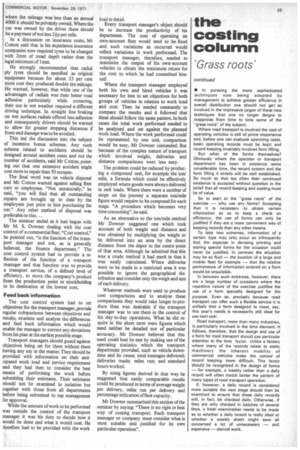the costing column
Page 25

If you've noticed an error in this article please click here to report it so we can fix it.
'Grass roots'
continued
• In pursuing the more sophisticated techniques now being adopted by management to achieve greater efficiency in overall distribution one should not get so involved in the impressive jargon of these new techniques that one no longer deigns to reappraise from time to time some of the "grass roots'. of the subject.
Where road trasnport is involved the cost of operating vehicles is still of prime importance and, before one can evaluate operating costs, basic operating records must be kept: and record keeping invariably involves form filling.
But what of the forms themselves? Obviously where the operator or transport department has been in existence some considerable time, the record system and the form filling it entails will be well established. So much so that too often their continued existence is accepted without question in the belief that all record keeping and costing must be of value.
So to start at the -grass roots" of the exercise — why use any forms? Accepting that it is necessary to obtain certain information so as to keep a check on efficiency, the use of forms can only be justified if they are a more convenient way of keeping records than any other means.
To take two extremes, information of a certain type may only occur so infrequently that the expense in devising printing and storing special forms for the occasion could never be justified. In contrast the situation may be so fluid — the location of a large and mobile fleet for example — that the relative permanence of information entered on a form would be unsuitable.
In between such extremes, however, there are a large number of occasions where the repetitive nature of the exercise justifies the use of a form specially designed for the purpose. Even so, precisely because road transport can offer such a flexible service it is unlikely that a form designed to meet, say, this year's needs is necessarily still ideal for use next year.
Road transport, more than many industries, is particularly involved in the time element. It follows, therefore, that the design and use of a form for road transport should pay particular attention to the time factor. Unlike a factory where many of the records relate to static machinery the inherent mobility of commercial vehicles make the control of record keeping more difficult. This factor should be recognized in the design of forms — for example, a weekly rather than a daily record will often match better the pattern of many types of road transport operation.
If, however, a daily record is considered more suitable the next stage should then be examined to ensure that these daily records will, in fact, be checked daily. Otherwise, if they are only checked in batches of several days, a fresh examination needs to be made as to whether a daily record is really ideal or whether a weekly sheet might save all concerned a lot of unnecessary — and expensive — clerical work.


















































































